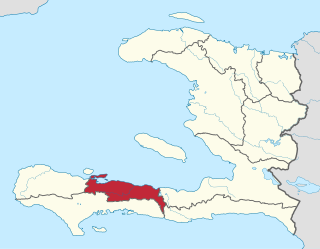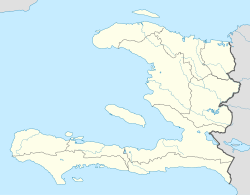
The Dominican Republic is a country located in the island of Hispaniola, in the Greater Antilles archipelago of the Caribbean region. It occupies the eastern five-eighths of the island, which it shares with the nation of Haiti, making Hispaniola one of two Caribbean islands, along with Saint Martin, that are shared by two sovereign states. The Dominican Republic is the second-largest Caribbean nation by area at 48,671 square kilometers (18,792 sq mi), and third by population with approximately 10 million people, of which approximately three million live in the metropolitan area of Santo Domingo, the capital city.

Haiti, officially the Republic of Haiti and formerly called Hayti, is a country located on the island of Hispaniola, east of Cuba in the Greater Antilles archipelago of the Caribbean Sea. It occupies the western three-eighths of the island, which it shares with the Dominican Republic. Haiti is 27,750 square kilometres (10,714 sq mi) in size and has an estimated 10.8 million people, making it the most populous country in the Caribbean Community (CARICOM) and the second-most populous country in the Caribbean as a whole.

The recorded written history of Haiti began on 5 December 1492 when the European navigator Christopher Columbus happened upon a large island in the region of the western Atlantic Ocean that later came to be known as the Caribbean. It was inhabited by the Taíno, and Arawakan people, who variously called their island Ayiti, Bohio, or Kiskeya(Quisqueya). Columbus promptly claimed the island for the Spanish Crown, naming it La Isla Española, later Latinized to Hispaniola. French influence began in 1625, and French control of what was called Saint-Domingue—modern-day Haiti—began in 1660. From 1697 on, the western part of the island was French and the eastern part was Spanish. Haiti became one of the wealthiest of France's colonies, producing vast quantities of sugar and coffee and depended on a brutal slave system for the necessary labor. Inspired by the message of the French Revolution, Haitian slaves rose up in revolt in 1791 and after decades of struggle the independent republic of Haiti was officially proclaimed in 1804.

Hispaniola is an island in the Caribbean island group known as the Greater Antilles. It is the second largest island in the Caribbean after Cuba, and the most populous island in the Caribbean; it is also the eleventh most populous island in the world.

Jean-Bertrand Aristide is a former Haitian priest and politician who became Haiti's first democratically elected president. A proponent of liberation theology, Aristide was appointed to a Roman Catholic parish in Port-au-Prince in 1982 after completing his studies to become a priest of the Salesian order. He became a focal point for the pro-democracy movement first under Jean-Claude "Baby Doc" Duvalier and then under the military transition regime which followed. He won the Haitian general election between 1990 and 1991, with 67% of the vote and was briefly president of Haiti, until a September 1991 military coup. The coup regime collapsed in 1994 under U.S. pressure and threat of force. Aristide was then president again from 1994 to 1996 and from 2001 to 2004. However, Aristide was ousted in the 2004 coup d'état after right-wing ex-army paramilitaries invaded the country from across the Dominican border. Aristide has claimed the United States helped orchestrate the coup against him. Aristide was later forced into exile in the Central African Republic and South Africa. He finally returned to Haiti in 2011 after seven years in exile.

Jean-Claude Duvalier, nicknamed "Baby Doc", was the President of Haiti from 1971 until he was overthrown by a popular uprising in 1986. He succeeded his father François "Papa Doc" Duvalier as the ruler of Haiti after his death in 1971. After assuming power, he introduced cosmetic changes to his father's regime and delegated much authority to his advisors. Thousands of Haitians were killed or tortured, and hundreds of thousands fled the country during his presidency. He maintained a notoriously lavish lifestyle while poverty among his people remained the most widespread of any country in the Western Hemisphere.

Nel Ust Wyclef Jean is a Haitian rapper, musician and actor. At the age of nine, Jean emigrated to the United States with his family. He first achieved fame as a member of the New Jersey hip hop group the Fugees. Jean has won three Grammy Awards for his musical work.
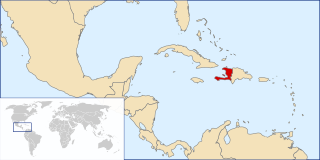
Haitian Creole is a French-based creole language spoken by 10–12 million people worldwide, and the only language of most Haitians. It is a creole language based largely on 18th-century French with influences from Portuguese, Spanish, English, Taíno, and West African languages. Haitian Creole emerged from contact between French settlers and African slaves during the Atlantic slave trade in the French colony of Saint-Domingue. Haitians are the largest creole-speaking community in the world.
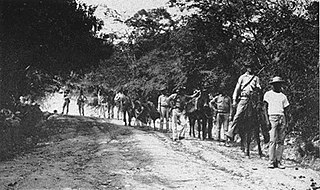
The United States occupation of Haiti began on July 28, 1915, when 330 US Marines landed at Port-au-Prince, Haiti, on the authority of US President Woodrow Wilson. The first invasion forces had already disembarked from USS Montana on January 27, 1914. The July intervention took place following the murder of dictator President Vilbrun Guillaume Sam by insurgents angered by his political executions of elite opposition.
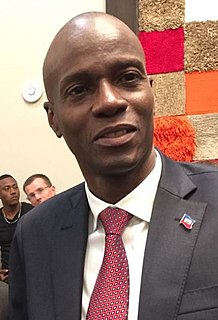
The President of Haiti, officially called the President of the Republic of Haiti is the head of state of Haiti. Executive power in Haiti is divided between the president and the government headed by the Prime Minister of Haiti. The current president is Jovenel Moïse, who took office on February 7, 2017.

The Haitian Revolution was a successful anti-slavery and anti-colonial insurrection by self-liberated slaves against French colonial rule in Saint-Domingue, now the sovereign nation of Haiti. It began on 22 August 1791, and ended in 1804 with the former colony's independence. It involved blacks, mulattoes, French, Spanish, and British participants—with the ex-slave Toussaint L'Ouverture emerging as Haiti's most charismatic hero. It was the only slave uprising that led to the founding of a state which was both free from slavery, and ruled by non-whites and former captives. It is now widely seen as a defining moment in the history of racism in the Atlantic World.
The Haiti national football team represents Haiti in international men's association football. Haiti is administered by the Fédération Haïtienne de Football (FHF), the governing body for football in Haiti. They have been a member of FIFA since 1934, a member of CONCACAF since 1961 and a member of the Caribbean Football Union (CFU) since 1978. Haiti's home ground is Stade Sylvio Cator in Port-au-Prince and their head coach was Patrice Neveu, until December 2016.
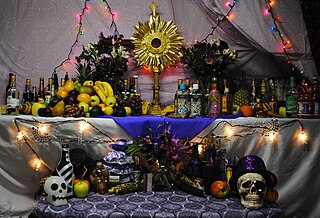
Haitian Vodou is a syncretic religion practiced chiefly in Haiti and the Haitian diaspora. Practitioners are called "vodouists" or "servants of the spirits".

Haiti has a sizable diaspora, present chiefly in the Dominican Republic, the United States, Canada, Cuba, the Bahamas, and France. They also live in other countries like Belgium, Jamaica, Turks and Caicos, Mexico, U.S. Virgin Islands, Brazil and Chile, among others.
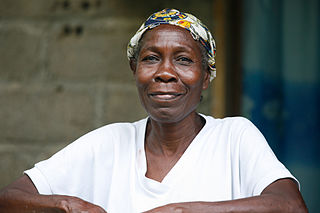
Women in Haiti have equal constitutional rights as men in the economic, political, cultural and social fields, as well as in the family.

The Armed Forces of Haiti, consisted of the Haitian Army, Haitian Navy, the Haitian Air Force, Haitian Coast Guard, and some police forces. The Army was always the dominant service with the others serving primarily in a support role. The name of Haiti's military was changed from the Garde d'Haiti to the Forces Armées d'Haïti—FAd'H in 1958 during the rule of François Duvalier. After years of military interference in politics, including dozens of military coups, Haiti disbanded its military in 1995.

The 2010 Haiti earthquake was a catastrophic magnitude 7.0 Mw earthquake, with an epicenter near the town of Léogâne (Ouest) and approximately 25 kilometres (16 mi) west of Port-au-Prince, Haiti's capital. The earthquake occurred at 16:53 local time on Tuesday, 12 January 2010.
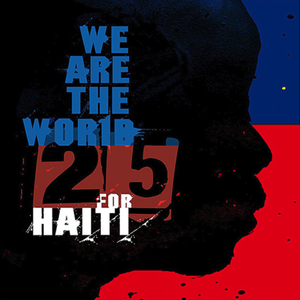
"We Are the World 25 for Haiti" is a charity single recorded by the supergroup Artists for Haiti in 2010. It is a remake of the 1985 hit song "We Are the World", which was written by American musicians Michael Jackson and Lionel Richie, and was recorded by USA for Africa to benefit famine relief in Africa. Initially, in late 2009, it had been suggested to Richie and Quincy Jones—producer of the original "We Are the World"—that a re-cut version of the song be re-released under the title "Live 25". Following the magnitude 7.0 Mw earthquake in Haiti, which devastated the area and killed thousands of people, it was agreed that the song would be re-recorded by new artists, in the hope that it would reach a new generation and help benefit the people of Haiti.

Haitians are the citizens of Haiti and their descendants in the Haitian diaspora.
